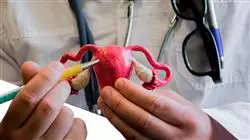University certificate
The world's largest faculty of medicine”
Introduction to the Program
This Hybrid professional master’s degree will give you a current and innovative vision of Endometriosis treatments in fertile and postmenopausal age”

Women suffering from Endometriosis are more likely to suffer from infertility problems (30%) and autoimmune diseases (12%), which is an added handicap to this chronic and painful pathology. However, the progress achieved thanks to research studies has opened the door to the introduction of new, more effective treatments, giving hope for a reduction in surgical interventions.
Medical professionals, however, continue to face the great challenge of achieving a correct diagnosis and success in women who have difficulty conceiving. Faced with this situation, TECH has created this Hybrid professional master’s degree, which offers specialists the opportunity to update their knowledge with the help of an excellent team of experts in Gynecology, Obstetrics and Human Reproduction.
All this, in addition, with an advanced syllabus 100% online and with multimedia content that will make the update much more enjoyable, compatible with the usual clinical internship and according to the needs of physicians. In addition, this program provides a unique experience by offering a 3-week internship in a hospital center that is at the forefront in the approach and management of patients suffering from Endometriosis.
In this way, the specialist will be together with the best in this field, who will show them the most innovative procedures in patients suffering from this disease in infantile, fertile or postmenopausal age. In addition, they will learn about the most effective ultrasound techniques, the most recent complementary tests, as well as the advances in the management of patients with other pathologies such as Lupus, Multiple Sclerosis, Cancer or Fibromyalgia.
Therefore, this institution offers physicians an excellent opportunity to keep up-to-date with the latest advances in Endometriosis through a degree designed by and for the most demanding professionals in their specialty.
This degree gives you the opportunity to be up-to-date in the progress achieved in the in-vitro fertilization of patients with Endometriosis”
This Hybrid professional master’s degree in Endometriosis contains the most complete and up-to-date scientific program on the market. The most important features include:
- More than 100 clinical cases presented by professionals experts in Endometriosis
- The graphic, schematic, and practical contents with which they are created, provide scientific and practical information on the disciplines that are essential for professional practice
- Patient assessment and monitoring
- Comprehensive systematized action plans for the main pathologies related to Endometriosis
- Presentation of practical workshops on procedures, diagnosis, and treatment techniques in patients with Endometriosis
- An algorithm-based interactive learning system for decision-making in the clinical situations presented throughout the course
- Practical clinical guides on approaching different pathologies
- With a special emphasis on evidence-based medicine and research methodologies in Endometriosis
- All this will be complemented by theoretical lessons, questions to the expert, debate forums on controversial topics, and individual reflection assignments
- Content that is accessible from any fixed or portable device with an Internet connection
- Furthermore, they will be able to carry out a clinical internship in one of the best hospitals
A program in which you will have an intensive 3-week internship in a relevant hospital center with professionals specialized in Endometriosis”
This Master's program, which has a professionalizing nature and a hybrid learning modality, is aimed at updating medical professionals who perform their functions in hospitals and fertilization clinics, and who require a high level of qualification. The contents are based on the latest scientific evidence, and oriented in a educational way to integrate theoretical knowledge in the medical practice, and the theoretical-practical elements will facilitate the updating of knowledge and allow decision-making in patient management.
The multimedia content developed with the latest educational technology will provide the medical professional with situated and contextual learning, i.e., a simulated environment that will provide an immersive education program to learn in real situations. This program is designed around Problem-Based Learning, whereby the physician must try to solve the different professional practice situations that arise during the course. For this purpose, the student will be assisted by an innovative interactive video system created by renowned experts.
This Hybrid professional master’s degree has a 100% online theoretical content that you can access comfortably from any device with Internet connection"

With this program you will get a complete update on the main post-surgical complications of Endometriosis"
Why study at TECH?
TECH is the world’s largest online university. With an impressive catalog of more than 14,000 university programs available in 11 languages, it is positioned as a leader in employability, with a 99% job placement rate. In addition, it relies on an enormous faculty of more than 6,000 professors of the highest international renown.

Study at the world's largest online university and guarantee your professional success. The future starts at TECH”
The world’s best online university according to FORBES
The prestigious Forbes magazine, specialized in business and finance, has highlighted TECH as “the world's best online university” This is what they have recently stated in an article in their digital edition in which they echo the success story of this institution, “thanks to the academic offer it provides, the selection of its teaching staff, and an innovative learning method aimed at educating the professionals of the future”
A revolutionary study method, a cutting-edge faculty and a practical focus: the key to TECH's success.
The most complete study plans on the university scene
TECH offers the most complete study plans on the university scene, with syllabuses that cover fundamental concepts and, at the same time, the main scientific advances in their specific scientific areas. In addition, these programs are continuously being updated to guarantee students the academic vanguard and the most in-demand professional skills. In this way, the university's qualifications provide its graduates with a significant advantage to propel their careers to success.
TECH offers the most comprehensive and intensive study plans on the current university scene.
A world-class teaching staff
TECH's teaching staff is made up of more than 6,000 professors with the highest international recognition. Professors, researchers and top executives of multinational companies, including Isaiah Covington, performance coach of the Boston Celtics; Magda Romanska, principal investigator at Harvard MetaLAB; Ignacio Wistumba, chairman of the department of translational molecular pathology at MD Anderson Cancer Center; and D.W. Pine, creative director of TIME magazine, among others.
Internationally renowned experts, specialized in different branches of Health, Technology, Communication and Business, form part of the TECH faculty.
A unique learning method
TECH is the first university to use Relearning in all its programs. It is the best online learning methodology, accredited with international teaching quality certifications, provided by prestigious educational agencies. In addition, this disruptive educational model is complemented with the “Case Method”, thereby setting up a unique online teaching strategy. Innovative teaching resources are also implemented, including detailed videos, infographics and interactive summaries.
TECH combines Relearning and the Case Method in all its university programs to guarantee excellent theoretical and practical learning, studying whenever and wherever you want.
The world's largest online university
TECH is the world’s largest online university. We are the largest educational institution, with the best and widest online educational catalog, one hundred percent online and covering the vast majority of areas of knowledge. We offer a large selection of our own degrees and accredited online undergraduate and postgraduate degrees. In total, more than 14,000 university degrees, in eleven different languages, make us the largest educational largest in the world.
TECH has the world's most extensive catalog of academic and official programs, available in more than 11 languages.
Google Premier Partner
The American technology giant has awarded TECH the Google Google Premier Partner badge. This award, which is only available to 3% of the world's companies, highlights the efficient, flexible and tailored experience that this university provides to students. The recognition as a Google Premier Partner not only accredits the maximum rigor, performance and investment in TECH's digital infrastructures, but also places this university as one of the world's leading technology companies.
Google has positioned TECH in the top 3% of the world's most important technology companies by awarding it its Google Premier Partner badge.
The official online university of the NBA
TECH is the official online university of the NBA. Thanks to our agreement with the biggest league in basketball, we offer our students exclusive university programs, as well as a wide variety of educational resources focused on the business of the league and other areas of the sports industry. Each program is made up of a uniquely designed syllabus and features exceptional guest hosts: professionals with a distinguished sports background who will offer their expertise on the most relevant topics.
TECH has been selected by the NBA, the world's top basketball league, as its official online university.
The top-rated university by its students
Students have positioned TECH as the world's top-rated university on the main review websites, with a highest rating of 4.9 out of 5, obtained from more than 1,000 reviews. These results consolidate TECH as the benchmark university institution at an international level, reflecting the excellence and positive impact of its educational model.” reflecting the excellence and positive impact of its educational model.”
TECH is the world’s top-rated university by its students.
Leaders in employability
TECH has managed to become the leading university in employability. 99% of its students obtain jobs in the academic field they have studied, within one year of completing any of the university's programs. A similar number achieve immediate career enhancement. All this thanks to a study methodology that bases its effectiveness on the acquisition of practical skills, which are absolutely necessary for professional development.
99% of TECH graduates find a job within a year of completing their studies.
Hybrid Professional Master's Degree in Endometriosis
Endometriosis is a disease that affects millions of women around the world, and our Master's Degree, wants to be a tool for the best treatment against this health condition and improve the state of well-being of our patients. That is why at TECH Global University we are committed to the training of highly qualified professionals in the field of endometriosis, and we have developed the Hybrid Professional Master's Degree in Endometriosis. At TECH, we understand the importance of offering a high quality program that is tailored to the needs of students. That is why our Master's is based on a 100% online methodology for theoretical learning, which allows you to access the content from anywhere and at any time. However, we also recognize the importance of clinical practice, so we have designed a curriculum that includes face-to-face internships in clinics, hospitals and specialized centers, where you can apply your knowledge and skills in real situations.
Advance your career with this Hybrid Professional Master's Degree
Our Hybrid Professional Master's Degree program in Endometriosis focuses on providing you with an in-depth understanding of this disease, including its pathophysiology, diagnosis and more advanced treatment options. You will learn about the most up-to-date surgical techniques, multidisciplinary approaches to management and hormone therapy options. You will also become familiar with the latest research advances and future prospects in the field of endometriosis. At TECH Global University, we are proud to have a team of expert faculty with extensive experience in the field of endometriosis who will guide you throughout your academic journey and provide you with the support you need to achieve your career goals. If you are ready to become a leader in the field of endometriosis and make a difference in the lives of affected women, don't miss the opportunity to join our Hybrid Professional Master's Degree in Endometriosis at TECH Global University. Enroll today and take a step forward in your professional medical career!







